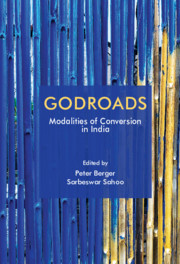Book contents
- Frontmatter
- Contents
- Foreword
- Acknowledgements
- Introduction
- 1 The Rise, Growth and Significance of Shudra Conversion Movements in the Methodist Mission, Hyderabad, 1925–1947
- 2 Communism and the Cross: A Caste–Class Trajectory of Religious Conversion in South India
- 3 Religious Conversion as Ethical Transformation: A Study of Islamic Reformism in Rural West Bengal
- 4 Conversion versus Unity: The Basel Mission among the Badaga on the Nilgiri Plateau, 1845–1915
- 5 Identity Change and the Construction of Difference: Colonial and Postcolonial Conversions among the Sumi Naga of Nagaland, Northeast India
- 6 Conversion to Christianity and Healing: The Naga of Northeast India
- 7 Reshaping the American Evangelical Conversion Narrative in Nineteenth-Century North India
- 8 Cultural Transformations through Performance Arts in Early Twentieth-Century South India
- 9 Reservation and Religious Freedom: Understanding Conversion and Hindu–Christian Conflict in Odisha and Rajasthan
- 10 Rupture and Resilience: Dynamics between a Hindu Reform Movement and an Indigenous Religion in Highland Odisha
- Afterword: India Seen from Amazonia
- About the Contributors
- Index
5 - Identity Change and the Construction of Difference: Colonial and Postcolonial Conversions among the Sumi Naga of Nagaland, Northeast India
Published online by Cambridge University Press: 24 April 2020
- Frontmatter
- Contents
- Foreword
- Acknowledgements
- Introduction
- 1 The Rise, Growth and Significance of Shudra Conversion Movements in the Methodist Mission, Hyderabad, 1925–1947
- 2 Communism and the Cross: A Caste–Class Trajectory of Religious Conversion in South India
- 3 Religious Conversion as Ethical Transformation: A Study of Islamic Reformism in Rural West Bengal
- 4 Conversion versus Unity: The Basel Mission among the Badaga on the Nilgiri Plateau, 1845–1915
- 5 Identity Change and the Construction of Difference: Colonial and Postcolonial Conversions among the Sumi Naga of Nagaland, Northeast India
- 6 Conversion to Christianity and Healing: The Naga of Northeast India
- 7 Reshaping the American Evangelical Conversion Narrative in Nineteenth-Century North India
- 8 Cultural Transformations through Performance Arts in Early Twentieth-Century South India
- 9 Reservation and Religious Freedom: Understanding Conversion and Hindu–Christian Conflict in Odisha and Rajasthan
- 10 Rupture and Resilience: Dynamics between a Hindu Reform Movement and an Indigenous Religion in Highland Odisha
- Afterword: India Seen from Amazonia
- About the Contributors
- Index
Summary
‘Nagaland is the most Baptist state in the world’, ‘The Nagas are the only Baptist nation in the world’, ‘Nagaland is a stronghold of Christianity in Asia’ – one is almost inevitably bound to hear such statements whenever one enquires about the contemporary significance of Christianity in the state of Nagaland in northeast India. These statements are usually uttered with a great sense of pride, and while they necessarily replicate official church discourses, they also reflect individual sentiments of accomplishment. For the social scientist, however, the fact that only 100 years ago, Nagaland was certainly none of these raises a series of questions regarding the multiple sociocultural and political transformations that have affected Naga society in the span of a century or so. The issue of conversion is certainly one of the core questions in this respect.
The question as to why people convert has been a core research interest within social anthropology and other cognate disciplines, and a number of theoretical approaches have been suggested in an attempt to explicate this phenomenon. As Joel Robbins aptly points out, studies of conversion to so-called world religions usually rely either on ‘utilitarian’ or ‘intellectualist’ explanations. The former ‘focuses on the worldly advantages, in terms of material goods, position, power, prestige, and so forth, that accrue to those who convert’. The latter ‘emphasizes matters of meaning, and argues that converts are attracted to the new religion because it renders meaningful new situations that defy the sense-making capacities of their traditional ways of understanding the world’ (Robbins 2004: 84–85). Moreover, according to Robbins, the two approaches need not be juxtaposed but rather ‘can be productively used together’ in a ‘two-stage model of conversion’: while utilitarian explanations are more useful in understanding early conversions, a focus on meaning-making is more useful in explaining why converts choose to retain their new religion (Robbins 2004: 85–87). Building on Robbins’ useful model, my own ethnographic data suggests that people's motivations for conversion are also heavily influenced by the wider sociocultural and political environment, and a focus on how conversion is related to the construction of collective identities will fruitfully elucidate important nuances that cannot be unequivocally described as either utilitarian or intellectualist.
- Type
- Chapter
- Information
- GodroadsModalities of Conversion in India, pp. 129 - 154Publisher: Cambridge University PressPrint publication year: 2020



